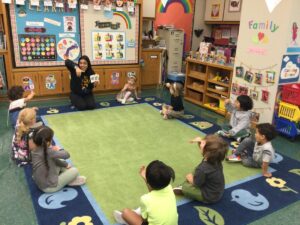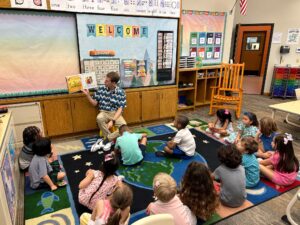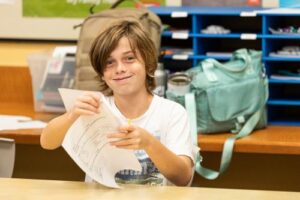In a recent The New York Times opinion piece, David Brooks discussed the “essential skills for being human.” He points out that “building a friendship or creating a community involves performing a series of small, concrete actions well,” namely:
- being curious about other people;
- disagreeing without poisoning relationships;
- revealing vulnerability at an appropriate pace;
- being a good listener;
- knowing how to ask for and offer forgiveness;
- knowing how to host a gathering where everyone feels embraced;
- knowing how to see things from another’s point of view.
 At Turning Point, we teach these foundational skills explicitly, from the very first day of school. Our social-emotional curriculum is fostered during intentional lessons on the ECD carpet, at Morning Meetings in elementary classrooms, and in middle school Advisory. It also occurs in the myriad, real-time “teachable moments” that present themselves when children encounter each other—which is to say, all day long. Teaching children how to be compassionate, empathic peers and friends, even when life is complex and difficult, is a key moral skill.
At Turning Point, we teach these foundational skills explicitly, from the very first day of school. Our social-emotional curriculum is fostered during intentional lessons on the ECD carpet, at Morning Meetings in elementary classrooms, and in middle school Advisory. It also occurs in the myriad, real-time “teachable moments” that present themselves when children encounter each other—which is to say, all day long. Teaching children how to be compassionate, empathic peers and friends, even when life is complex and difficult, is a key moral skill.
 While our Turning Point elements are arranged under five separate pillars (Intellectual, Social, Physical, Ethical, Emotional), these pillars are interlaced and interdependent. For example, students learn that elements of critical thinking, inquiry, and problem-solving gain power when paired with elements of equity, courage, and compassion; that reasoning requires respect, and accountability requires integrity; that global citizenship and empathy are cut from the same cloth; that friendship and agility are inseparable.
While our Turning Point elements are arranged under five separate pillars (Intellectual, Social, Physical, Ethical, Emotional), these pillars are interlaced and interdependent. For example, students learn that elements of critical thinking, inquiry, and problem-solving gain power when paired with elements of equity, courage, and compassion; that reasoning requires respect, and accountability requires integrity; that global citizenship and empathy are cut from the same cloth; that friendship and agility are inseparable.
 When our students graduate and matriculate into ninth grade, we hear regularly that they are valued citizens in their new schools, they advocate for themselves and others, they know themselves and confidently share their opinions, they actively participate in class discussions, and they spearhead new clubs and initiatives. “I know Turning Point students because they look you in the eye,” was the way one admissions director explained it. Our students can hold their own in any social interaction because they know how to be themselves while honoring others with attention and care.
When our students graduate and matriculate into ninth grade, we hear regularly that they are valued citizens in their new schools, they advocate for themselves and others, they know themselves and confidently share their opinions, they actively participate in class discussions, and they spearhead new clubs and initiatives. “I know Turning Point students because they look you in the eye,” was the way one admissions director explained it. Our students can hold their own in any social interaction because they know how to be themselves while honoring others with attention and care.
We are always proud of our well-rounded students who “bring the thunder,” as we like to say. I thought of our graduates when I read Brooks’ definition of “illuminators:” people who are curious about others, who “shine the brightness of their care” on others, helping others to be their very best selves, reflecting the kind of “hospitality” that disseminates goodness.
The etymology of hospitality means “friendliness to guests,” which takes our attention outside ourselves onto the care of others. Unsurprisingly, research shows that the more attuned we are to the outside world, the happier we are.
Awe transcends our understanding of the world and diminishes our sense of self; making time to watch the sunset or pay attention to the natural world can enhance our well-being—sharing it with others only makes it more impactful. Research shows that observing the world with wonder and caring for others helps us to feel happier and to self-regulate. These actions help establish the foundation for an “illuminator” mindset.
 According to Brooks, we can also develop our children’s (and our own) “illuminator” mindsets by:
According to Brooks, we can also develop our children’s (and our own) “illuminator” mindsets by:
- Radiating warmth and giving people our deep attention
- Accompanying others by delighting in another person’s way of being (this means slowing down and favoring lingering over efficiency)
- Asking questions that demonstrate interest (and that de-center you) and listening “loudly.”
When we talk about a “sense of belonging,” these are many of the qualities that allow us to connect deeply, to see each other clearly, and to accept and appreciate one another because of and not despite our imperfections and differences.
I’m proud that at Turning Point, we create illuminators, able to honor both the importance of individual thought and the value of shared beliefs and practices. As we navigate the metaphorical darkness in our world and enter the literal darkness of the late fall and winter, we can be hopeful that our children at Turning Point will remain immersed in the positive reciprocity of cooperation, sharing, and kindness that can lead to sustained peace and light.
Warmly,
Laura
Dr. Laura Konigsberg
Head of School
lkonigsberg@turningpointschool.org


































